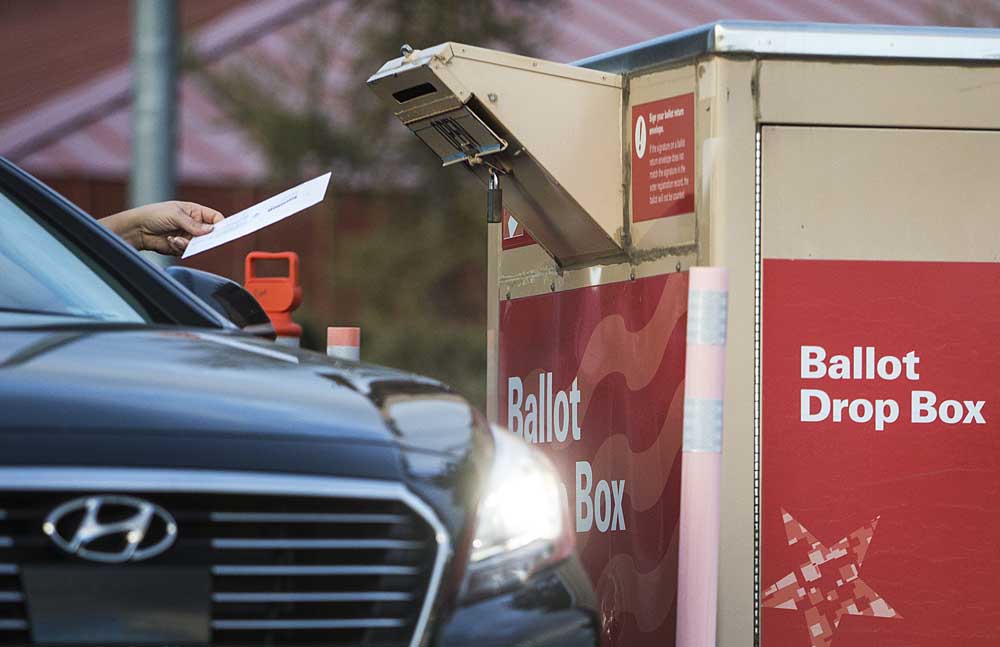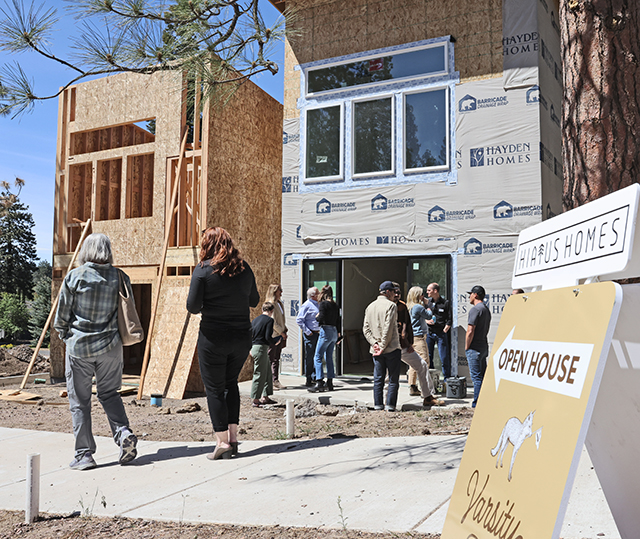End of election filled with fears amid flurry of votes
Published 6:00 pm Monday, November 2, 2020

- A voter drops off a ballot Friday at the Deschutes County Road Department drop box location in Bend.
Oregon was smashing records for early voting on Monday, even as state officials grappled with how to handle any voter intimidation in the final hours of the election and planned for possible riots in Portland after the polls close at 8 p.m. Tuesday.
Oregon’s vote-by-mail system is expected to result in relatively quick results tomorrow night. But the sharp partisan divide in the nation, shifting voting rules and President Donald Trump’s reluctance to promise a peaceful transition if he loses the election have ramped up the stress in a country already on edge.
“The pandemic, wildfires and political atmosphere have boosted fear and anxiety,” Gov. Kate Brown said Monday.
Brown made the comment at a press conference at which she announced a plan to use the Oregon State Police and Multnomah County Sheriff’s Office in Portland starting Monday night. The Oregon National Guard was ordered to put soldiers trained in crowd control on alert that they might be deployed if necessary.
National voting rights and militia monitoring groups called for an investigation of reports that gun-carrying Trump supporters at a rally at Lively Park in Springfield harassed people trying to use a ballot drop box in the parking lot.
The spectre of armed groups at ballot boxes or possibly violent confrontations in Portland overshadowed the basic political questions that will be decided with the voting that ends Tuesday.
Nearly 2 out of 3 ballots are already cast
The Oregon Secretary of State’s Office said 66.8% of eligible voters have turned in ballots as of Monday morning. That’s up from 61.7% the day before the 2016 presidential election.
Benton County continued to lead returns, with 74.7%. The top five are rounded out by Grant (72.9%) Tillamook (71.9%), Clackamas (71.9%) and Deschutes (71.5%).
Only three of the state’s 36 counties reported under 60% turnout on Monday: Malheur (55.9%), Umatilla (56.8%) and Josephine (57.1). Rounding out the bottom five are Jefferson (60.5%), Columbia and Klamath (both at 62.1%).
Republicans have almost closed the gap on Democrats for percentage of returned ballots. As of Monday, 79.2% of Democrats had voted vs. 73.5% of Republicans. The 5.7 point gap is down from more than 12% in the first days of ballot return counts.
Oregon is a lock to vote for Biden
Oregon last voted for the Republican presidential candidate in 1984, backing Ronald Reagan’s successful reelection bid. Since then, Oregon has gone to the Democrat, win or lose. Oregon backed Bill Clinton twice and Barack Obama twice in their winning campaigns. But Michael Dukakis, Al Gore, John Kerry and Hillary Clinton won Oregon, too.
A small window in Oregon indicating how the nationwide presidential vote might go can be found in the far northwest corner of the state. Tillamook and Columbia counties are the only two Oregon counties among just over 200 nationwide that voted for Obama in 2008 and 2012, then flipped for Trump in 2016. The top-of-the-ticket results in those counties will be posted on the Oregon Secretary of State’s election night website. They are odds-on the best local barometer on which way the national political winds.
House — $2 million for two years
If you want to know which races for the Legislature are key to each party’s political gameplan, just follow the money.
At least three House races are so close that the candidates are closing in on or over combined spending of $2 million for the seats, which will be up for election again in just two years.
Democrats currently hold a 38-22 majority that allows them to pass tax and other financial bills without Republican help. Then-House Minority Leader Carl Wilson, R-Grants Pass, said his small caucus weren’t “even speedbumps” against the Democrats.
Republicans would like to roll those numbers back, while Democrats dream of a historic first: Winning 40 seats that would give them the ability to have a quorum to vote on bills without Republicans. All but two GOP lawmakers walked out last winter to deny quorums to consider a carbon cap-and-trade bill. The move effectively killed what remained of the session, with several other major bills still pending.
One of the most expensive races involves the lone House Republican to stay in Salem during the walkout: Rep. Cheri Helt, R-Bend. She faces Democrat Jason Kropf, a Deschutes County deputy district attorney. Republicans have held the seat since 2008 despite a Democratic voter registration edge that has grown to 8,752.
State campaign finance records show that through Oct. 23, Helt has raised more than $999,000. Kropf has raised $512,000. Candidates have up to seven days to report campaign transactions. The true cost of the race won’t be known until after the vote is announced.
House seats in Clatsop County, Coos County and the Portland area have also exceeded or neared $2 in fundraising.
Senate’s slender split
Democrats have an 18-12 majority in the Senate, with 16 seats on the ballot on Tuesday. Republican senators have walked out of the two most recent sessions to deny a quorum on the carbon-cap bill. In 2019, they returned at the last minute for a two-day blitz of passing bills. But in 2020, they left again and the session ended with several bills dying along with the carbon cap. Democrats would need to pick up two seats to get to 20 in order to have a quorum without needing Republican defectors.
Sen. Tim Knopp, R-Bend, walked out in 2019, but was the only GOP senator to stay in Salem in 2020. Like Helt, he is a Republican in an increasingly Democratic district. The Democratic voter registration edge in his district has increased from 1,100 when Knopp last ran in 2016 to 5,500 today. He’s facing retired Daimler executive Eileen Kiely of Sunriver, who is also the secretary of the Democratic Party of Oregon.
The campaign is shaping up to be the most expensive Senate race of 2020. Knopp has raised $1.3 million to Kiely’s $643,000. A possible sign of concern for Knopp is that with one day to go, Democrats in Deschutes County have returned 84% of eligible ballots vs 77.5% of Republicans.
Republicans are going full bore to win a Coos County Senate seat with fundraising topping $2 million combined.
Oregon is not alone in having last gone Republican in 1984. The same is true for Washington, New York, Massachusetts, Rhode Island and Hawaii.
There are 2,868,686 registered voters in Oregon as of September, up about 2.7 percent from a year ago. Many “non-affiliated” voters were registered simultaneously with getting or renewing their drivers license and left the political party affiliation blank.
Democrats: 1,018,276
Non-Affiliated: 934,646
Republicans: 731,716
Non-Affiliated: 934,646
Independent: 124,657
Libertarian: 19,894
Other: 16,889
Working Families: 8,716
Pacific Green: 7,837
Progressive: 7,837






